Can nutritional epigenetics influence how we age and our life length? El Paso, Tx. Dr. Jimenez presents data on nutrition’s influence on longevity.
Longevity or our length of life is dictated by complex factors which include our genetic blueprint, age, health, and environment. This includes nutrition.
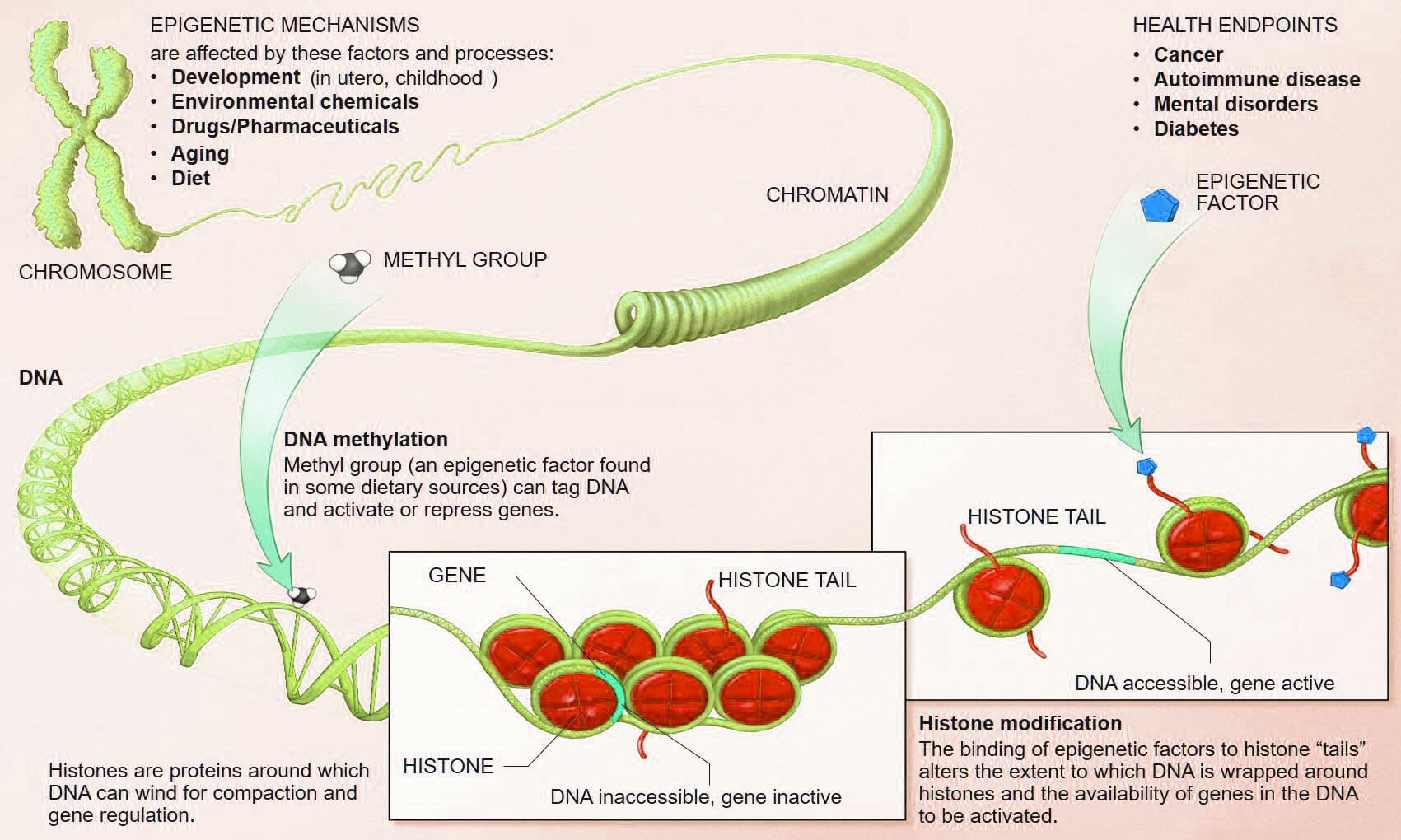
Gene-nutrient interactions are, partly responsible for regulating metabolic processes that begin and develop conditions like obesity, metabolic syndrome, cardiovascular disease, and cancer.
A mechanism of nutrient-gene interaction is the epigenetic involvement of inherited patterns of changes, that are maintained by other mechanisms in DNA, Fig. 1a
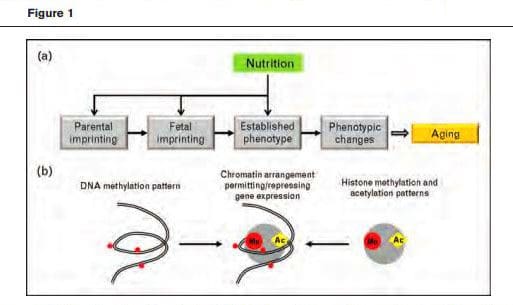
Two of these mechanisms are:
- Coding epigenetic information – DNA Methylation
- Histone Modifications
- This dictates chromatin structure, which allows up-regulation or repression of gene expression Fig. 1b
These mechanisms are considered to play important roles in the way we are shaped physiologically and in the way we age.
The Epigenome
- Think of DNA in the genome like the hardware of a phone that perform specific actions.
- The epigenome is the software, (program/s), that tells the hardware what to do.
Brought to you by the Salubrious Philanthropist
The Epigenome Becomes Altered Through Nutrition
Nutrition influences the epigenetic mechanisms responsible for phenotype/trait establishment.
Aging is partly regulated by epigenetic mechanisms.
Although still not fully proven but on the right track was that the availability of folate improved the regeneration of the adult central nervous system after injury through an epigenetic mechanism.
Epigenetic Aging
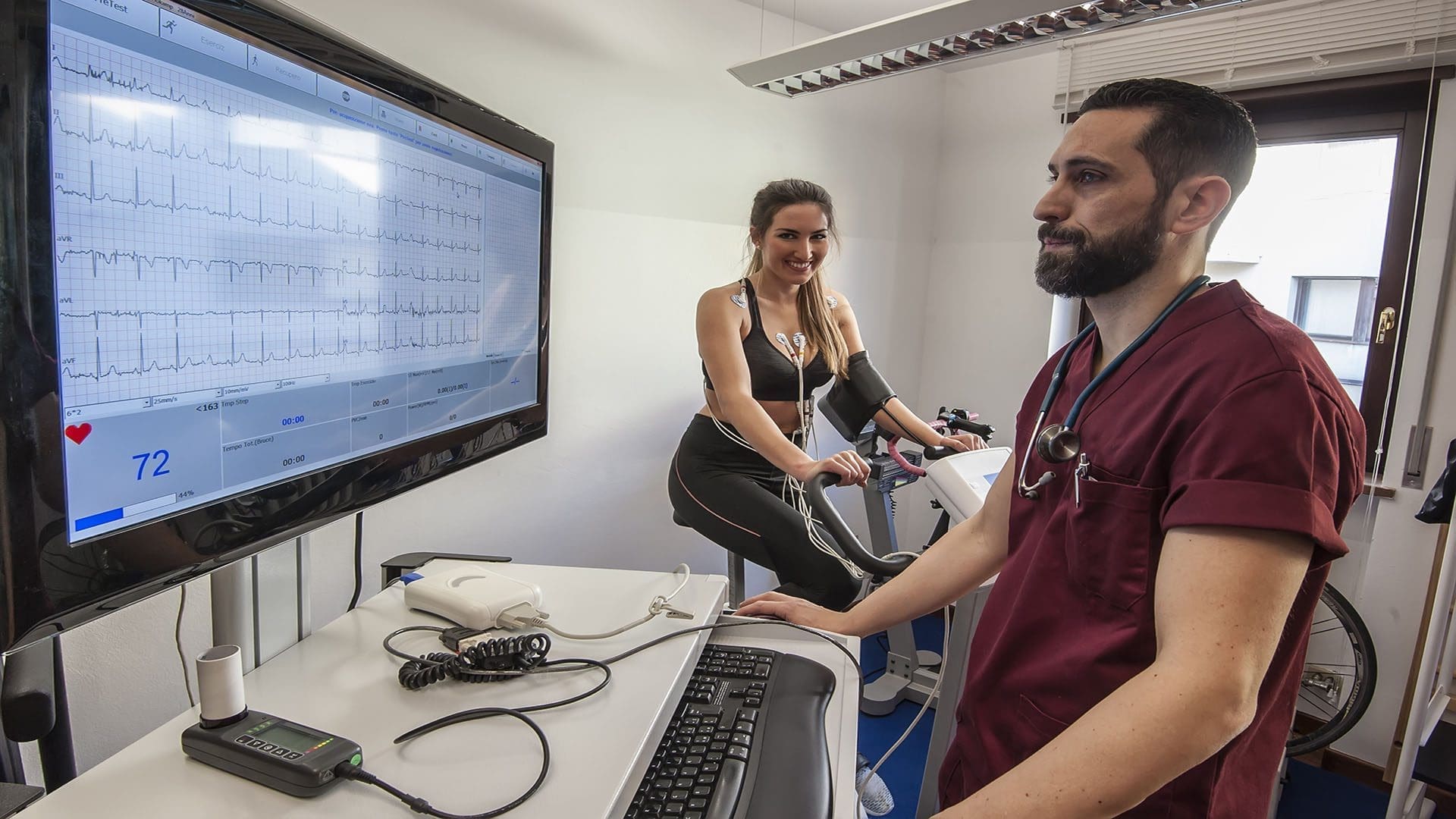
During the last couple of years, we witnessed a remarkable increase in the number of studies addressing the relationship between epigenetic alterations and aging. Still in its infancy, and still focusing mainly on brain aging, this research clearly indicated that epigenetic mechanisms are not only responsible, in part, for the aging process but they are also dynamically related with memory formation and maintenance.
Penner MR, Roth TL, Barnes CA, Sweatt JD. An epigenetic hypothesis of aging-related cognitive dysfunction. Front Aging Neurosci 2010; 2:9.
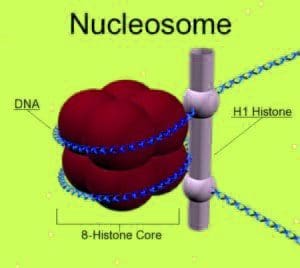
The manipulation of the epigenome for memory improvement became possible through changes in histone acetylation.
The Link: Nutrition & Longevity
Research to complete the chain of nutrition to epigenetic changes to how we age is still ongoing.
Present knowledge of the epigenetic roles in nutrition having to do with longevity/aging relies on the structure of three components:
- Nutritionally guided epigenetic modification
- Age-related epigenetic changes
- Comprehensive knowledge of both of these components
The first two are being developed quickly, but the third is the most demanding in terms of design, time, allocation, and cost. This takes more time. But technology/humanity is moving along at a quick pace, as well, because at the end of the day we all want to be healthy.
Therefore, Nutritional intervention, when applied at critical periods (e.g., embryonic and fetal development) is having a profound effect as to how the epigenome gets shaped.
When considering the beginning of chronic disease/s, being able to fight disease/s with food sounds like a win-win. If epigenetic/genomic nutrition can help in figuring out what we need to beat disease/s, then let’s go!
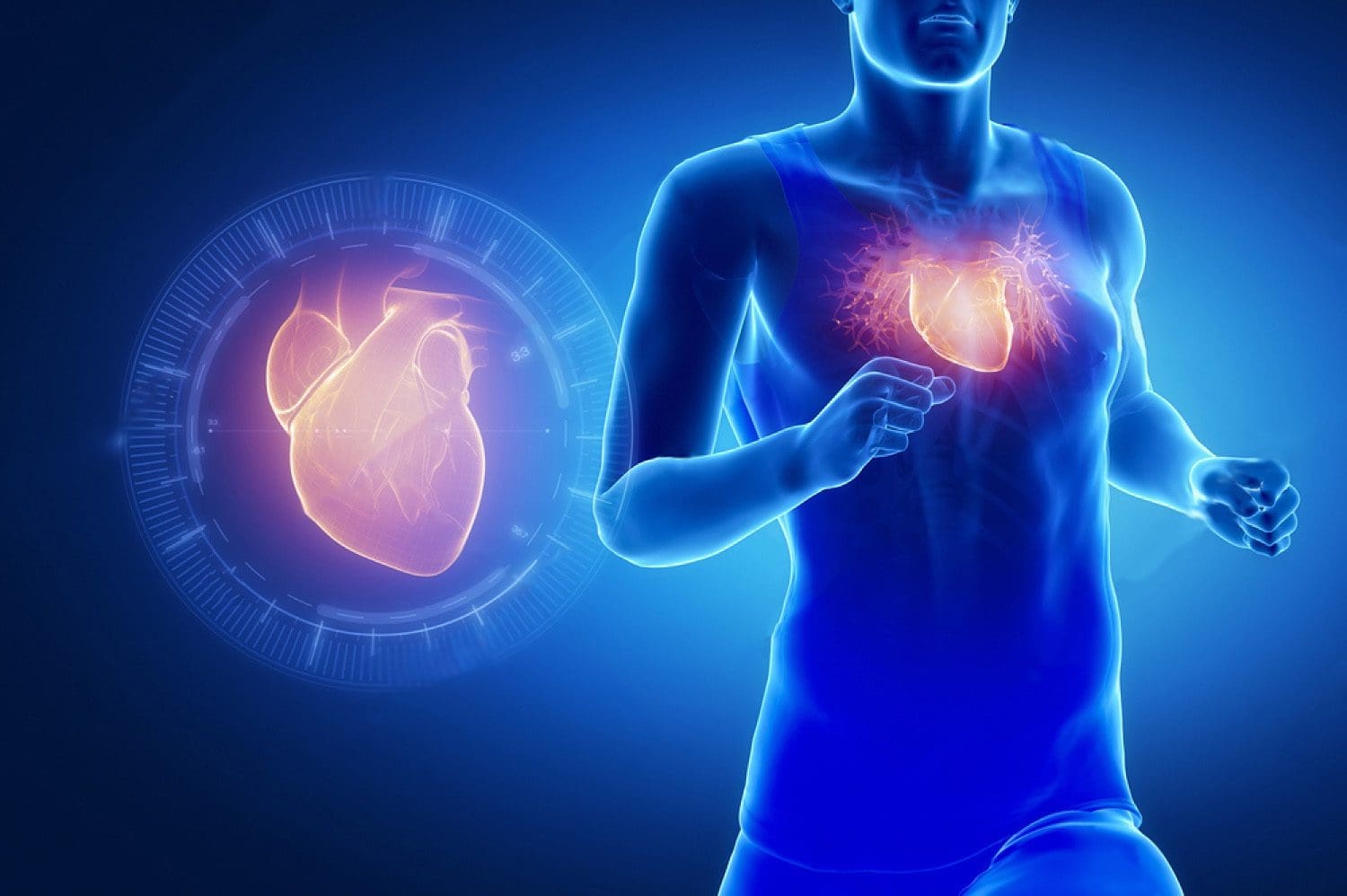
Post Disclaimer *
Professional Scope of Practice *
The information herein on "Epigenetics Nutritional Influence And Life Length | El Paso, Tx." is not intended to replace a one-on-one relationship with a qualified health care professional or licensed physician and is not medical advice. We encourage you to make healthcare decisions based on your research and partnership with a qualified healthcare professional.
Blog Information & Scope Discussions
Welcome to El Paso's Premier Fitness, Injury Care Clinic & Wellness Blog, where Dr. Alex Jimenez, DC, FNP-C, a Multi-State board-certified Family Practice Nurse Practitioner (FNP-BC) and Chiropractor (DC), presents insights on how our multidisciplinary team is dedicated to holistic healing and personalized care. Our practice aligns with evidence-based treatment protocols inspired by integrative medicine principles, similar to those found on this site and our family practice-based chiromed.com site, focusing on restoring health naturally for patients of all ages.
Our areas of multidisciplinary practice include Wellness & Nutrition, Chronic Pain, Personal Injury, Auto Accident Care, Work Injuries, Back Injury, Low Back Pain, Neck Pain, Migraine Headaches, Sports Injuries, Severe Sciatica, Scoliosis, Complex Herniated Discs, Fibromyalgia, Chronic Pain, Complex Injuries, Stress Management, Functional Medicine Treatments, and in-scope care protocols.
Our information scope is multidisciplinary, focusing on musculoskeletal and physical medicine, wellness, contributing etiological viscerosomatic disturbances within clinical presentations, associated somato-visceral reflex clinical dynamics, subluxation complexes, sensitive health issues, and functional medicine articles, topics, and discussions.
We provide and present clinical collaboration with specialists from various disciplines. Each specialist is governed by their professional scope of practice and their jurisdiction of licensure. We use functional health & wellness protocols to treat and support care for musculoskeletal injuries or disorders.
Our videos, posts, topics, and insights address clinical matters and issues that are directly or indirectly related to our clinical scope of practice.
Our office has made a reasonable effort to provide supportive citations and has identified relevant research studies that support our posts. We provide copies of supporting research studies upon request to regulatory boards and the public.
We understand that we cover matters that require an additional explanation of how they may assist in a particular care plan or treatment protocol; therefore, to discuss the subject matter above further, please feel free to ask Dr. Alex Jimenez, DC, APRN, FNP-BC, or contact us at 915-850-0900.
We are here to help you and your family.
Blessings
Dr. Alex Jimenez DC, MSACP, APRN, FNP-BC*, CCST, IFMCP, CFMP, ATN
email: [email protected]
Multidisciplinary Licensing & Board Certifications:
Licensed as a Doctor of Chiropractic (DC) in Texas & New Mexico*
Texas DC License #: TX5807, Verified: TX5807
New Mexico DC License #: NM-DC2182, Verified: NM-DC2182
Multi-State Advanced Practice Registered Nurse (APRN*) in Texas & Multi-States
Multistate Compact APRN License by Endorsement (42 States)
Texas APRN License #: 1191402, Verified: 1191402 *
Florida APRN License #: 11043890, Verified: APRN11043890 *
Verify Link: Nursys License Verifier
* Prescriptive Authority Authorized
ANCC FNP-BC: Board Certified Nurse Practitioner*
Compact Status: Multi-State License: Authorized to Practice in 40 States*
Graduate with Honors: ICHS: MSN-FNP (Family Nurse Practitioner Program)
Degree Granted. Master's in Family Practice MSN Diploma (Cum Laude)
Dr. Alex Jimenez, DC, APRN, FNP-BC*, CFMP, IFMCP, ATN, CCST
My Digital Business Card
RN: Registered Nurse
APRNP: Advanced Practice Registered Nurse
FNP: Family Practice Specialization
DC: Doctor of Chiropractic
CFMP: Certified Functional Medicine Provider
MSN-FNP: Master of Science in Family Practice Medicine
MSACP: Master of Science in Advanced Clinical Practice
IFMCP: Institute of Functional Medicine
CCST: Certified Chiropractic Spinal Trauma
ATN: Advanced Translational Neutrogenomics




